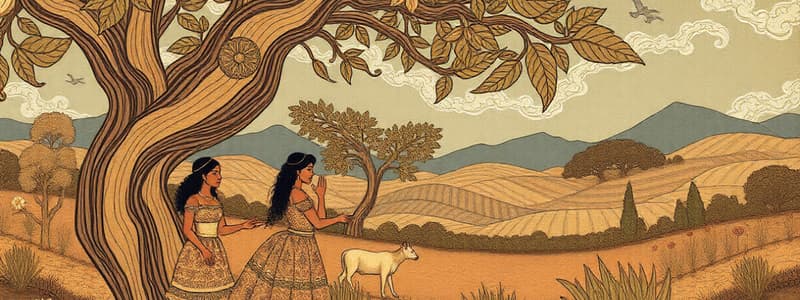Podcast
Questions and Answers
What was one consequence of the Little Ice Age that occurred from the 14th to the 19th century?
What was one consequence of the Little Ice Age that occurred from the 14th to the 19th century?
What percentage of the farms in Saskatchewan are managed by First Nation farmers?
What percentage of the farms in Saskatchewan are managed by First Nation farmers?
Which aspect is crucial for Indigenous communities in terms of agriculture?
Which aspect is crucial for Indigenous communities in terms of agriculture?
What led to the criticism of colonial policies regarding Indigenous agricultural practices?
What led to the criticism of colonial policies regarding Indigenous agricultural practices?
Signup and view all the answers
What is the primary source of agricultural knowledge for First Nation farmers?
What is the primary source of agricultural knowledge for First Nation farmers?
Signup and view all the answers
Which barrier contributes to the exclusion of First Nation farmers from agriculture?
Which barrier contributes to the exclusion of First Nation farmers from agriculture?
Signup and view all the answers
What proportion of non-Indigenous farmers contribute to agricultural knowledge acquisition?
What proportion of non-Indigenous farmers contribute to agricultural knowledge acquisition?
Signup and view all the answers
What did the engagement project aim to do for First Nations?
What did the engagement project aim to do for First Nations?
Signup and view all the answers
What percentage of Canada's total population do Indigenous Peoples represent?
What percentage of Canada's total population do Indigenous Peoples represent?
Signup and view all the answers
Which legal concepts justified colonial claims over Indigenous lands?
Which legal concepts justified colonial claims over Indigenous lands?
Signup and view all the answers
Which intercropping system supports the growth of corn, beans, and squash?
Which intercropping system supports the growth of corn, beans, and squash?
Signup and view all the answers
What type of ecological knowledge focuses on the relationships between living beings and their environment?
What type of ecological knowledge focuses on the relationships between living beings and their environment?
Signup and view all the answers
Which agricultural technique is NOT commonly associated with Indigenous practices?
Which agricultural technique is NOT commonly associated with Indigenous practices?
Signup and view all the answers
What is a common misconception about Indigenous cultures according to 19th-century evolutionary theory?
What is a common misconception about Indigenous cultures according to 19th-century evolutionary theory?
Signup and view all the answers
What agricultural practice was historically ignored due to a Eurocentric focus?
What agricultural practice was historically ignored due to a Eurocentric focus?
Signup and view all the answers
The decline of Cahokia was attributed to which factors?
The decline of Cahokia was attributed to which factors?
Signup and view all the answers
Study Notes
Indigenous Peoples in Canada
- 1.8 million Indigenous people in Canada, representing 5% of the population
- Their rights are rooted in historical ties and cultural distinctiveness, often overlooked
- Indigenous agricultural practices are integral to their cultures and ecological knowledge
Indigenous Rights
- Various international agreements safeguard Indigenous rights including the UNDRIP (United Nations Declaration on the Rights of Indigenous Peoples)
19th-Century Theories and Colonial Impact
- Unilineal evolution (savagery, barbarism, civilization) misrepresented Indigenous cultures
- Doctrine of Discovery and Terra Nullius justified colonial claims over Indigenous lands, impacting agricultural practices
- Eurocentric views led to ignoring Indigenous agricultural methods
Indigenous Agricultural Practices
- Indigenous techniques (digging stick, polycropping, mound planting) often outperformed European methods, producing 3-5 times more grain per acre
- The Three Sisters (corn, beans, squash intercropping) has been used for >500 years, enhancing soil fertility.
- Traditional Ecological Knowledge (TEK) emphasizes the relationship between Indigenous peoples and their environment
Historical Agricultural Systems
- Cahokia, the largest pre-Columbian settlement, thrived for >1,000 years through corn farming.
- Its eventual decline is linked to climate shifts and social-ecological factors.
Indigenous Innovations and Human Ecology
- Landscape burning, soil tilling, and selective harvesting enhanced ecological productivity.
- Controlled burns promoted plant production and wildlife availability
- Indigenous people adapted their practices in hunting, fishing, herding, and agriculture to their environments.
Climate Change and Indigenous Agriculture
- The Medieval Warm Period increased agricultural productivity (400-1600 AD).
- The Little Ice Age (14th-19th century) led to crop failures and societal stress.
Colonial Policies and Public Opposition to Indigenous Agriculture
- Colonial policies and settlers' views created barriers to Indigenous agricultural practices, seeing them as competition.
- The File Hills Farm Colony aimed to assimilate Indigenous youth, impacting agricultural productivity.
Contemporary Issues and Challenges
- Only about 2% of Saskatchewan's 37,000 farms are managed by Indigenous farmers due to high capital needs, lack of credit access, and inadequate leasing requirements.
Food Sovereignty and Knowledge Sources
- Food sovereignty is crucial for Indigenous communities for healthy, sustainably produced food.
- On-farm learning (77%) and traditional knowledge (65%) are main sources of agricultural knowledge for Indigenous farmers, alongside non-Indigenous farmers and private agronomists.
Involvement in Agri-Processing
- 64% of Indigenous communities aren't involved in agri-processing or agri-business activities, highlighting the need for greater involvement and innovation.
Conclusion
- Indigenous agriculture has a rich history and ecological knowledge.
- Systemic barriers and colonial legacies hinder Indigenous agricultural development.
- Collaborative initiatives that support traditional practices are key to revitalizing Indigenous food systems and achieving food sovereignty.
Studying That Suits You
Use AI to generate personalized quizzes and flashcards to suit your learning preferences.
Description
Explore the rich history and cultural practices of Indigenous peoples in Canada. This quiz examines their rights, agricultural techniques, and the impacts of colonial theories on their societies. Test your knowledge on the challenges and contributions of Indigenous communities.




